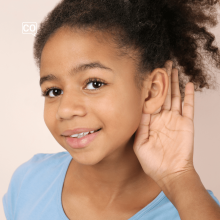Oír (to hear) - Condicional perfecto, indicativo (Past Conditional, indicative) - Spanish

Oír - Conjugation of to hear in Spanish: Conjugation table, examples and exercises in the past conditional, indicative tense (Condicional perfecto, indicativo).
Condicional perfecto, indicativo (Past Conditional, indicative)
All conjugations and tenses: Oír (to hear) - conjugation and tenses - (Spanish)
Syllabus: Spanish lesson - Sentidos y percepción (Senses and perceiving)
Conjugation of to hear in Condicional perfecto
- yo habría oído I would have heard
- tú habrías oído You would have heard
- él/ella habría oído He would have heard
- nosotros/nosotras habríamos oído we would have heard
- vosotros/vosotras habríais oído you would have heard
- ellos/ellas habrían oído They would have heard
Example phrases
- Yo habría oído a nuestros amigos en la fiesta. I would have heard our friends at the party.
- Tú habrías oído las felicitaciones en el cumpleaños. You would have heard the congratulations on the birthday.
- Él habría oído a sus primos llegar. He would have heard his cousins arrive.
- Nosotros habríamos oído la tarta de cumpleaños ser preparada. We would have heard the birthday cake being prepared.
- Vosotros habríais oído a la profesora decir los nombres. You would have heard the teacher say the names.
- Ellos habrían oído las felicitaciones de la familia. They would have heard the congratulations from the family.
Exercise: Conjugate the verbs - oír (to hear)
Instruction: Choose the correct word, read the sentence out loud and translate.
Show answers Show translationOír (Condicional perfecto, indicativo)
1. Él ... a sus primos llegar.
2. Vosotros ... a la profesora decir los nombres.
3. Ellos ... las felicitaciones de la familia.
4. Yo ... a nuestros amigos en la fiesta.
5. Tú ... las felicitaciones en el cumpleaños.
6. Nosotros ... la tarta de cumpleaños ser preparada.